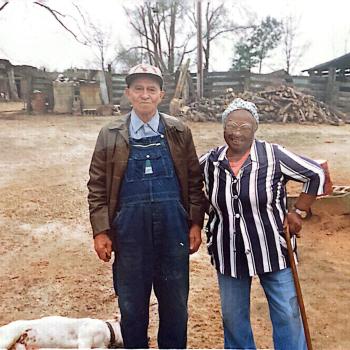 For many non-Mormons, the Book of Mormon is one of the stranger things about The Church of Jesus Christ of Latter-day Saints—whose members are often called "Mormons" because of our belief in that book. The Book of Mormon claims to be the translation of an ancient record of people in the Americas for whom there is no indisputable archaeological evidence, and the translation was made by an uneducated young farmer from the American 19th-century frontier. Joseph Smith, the young farmer, said that he had received the book from an angel and translated it by the power of God.
For many non-Mormons, the Book of Mormon is one of the stranger things about The Church of Jesus Christ of Latter-day Saints—whose members are often called "Mormons" because of our belief in that book. The Book of Mormon claims to be the translation of an ancient record of people in the Americas for whom there is no indisputable archaeological evidence, and the translation was made by an uneducated young farmer from the American 19th-century frontier. Joseph Smith, the young farmer, said that he had received the book from an angel and translated it by the power of God.
Reasonable people could be forgiven for not believing that story. Nevertheless, millions of well-educated, reasonable people do believe it, including me. It is a stumbling-block and foolishness to those who do not believe (cf. 1 Cor. 1:23).
Though I believed that the Book of Mormon was the word of God when I became a Mormon, I joined without having read more of it than the passages marked by the missionaries. I believed that the book was what it claimed to be only because, through a powerful conversion experience, I had come to believe that I should join the LDS Church. As we Mormons say, I had a testimony of the Church. To me that meant that I also had a testimony of the Book of Mormon. But the book had little effect on me. I didn't know its stories or teachings. I didn't like reading it, for many years much preferred the New Testament and the Old Testament.
I first read the Book of Mormon from front to back as a missionary in Korea in the '60s, and I read it regularly; but we didn't have the Book of Mormon in Korean for the first part of my missionary service, so it played little role in my missionary work. My familiarity with the Bible was sufficient. After my return home, I continued to focus most of my scripture study on the Bible. My attitude toward the Book of Mormon was, "It's true, revealed by God through Joseph Smith, but—though Mark Twain was exaggerating when he described it as 'chloroform in print'—he wasn't far from the mark."
That did not change until sometime in the 1980s, when a friend helped me see the Book of Mormon in a new light. For the first time, I saw it as central to Latter-day Saint being. For the first time, I found it beautiful and interesting. As a result, even though I was late in coming to appreciate the Book of Mormon, I now think of it as a divine gift.
God has given us many gifts. The most obvious is the Atonement of Christ, the suffering and sacrifice of the Son that makes our adoption into the Father's household possible (cf. Rom. 8:14-16). As a gift, the Atonement makes it possible not only for us to overcome the corruption brought on by death and disease, but also to overcome the corruption we bring on ourselves by sin.
God has also given us this world and its universe, and the wonders of nature that surround us; a history in which we continue to see the gradual though often interrupted growth of freedom in the world; the beauty of literature, painting, sculpture, photography, music, dance, and worship; for most of those who read this column, opportunities to learn and grow so that our lives might be more rich and we might find more and more ways to improve the quality of our lives and those of others; and families and loved ones, people on whom most of us can rely for comfort, learning, support, edification, and opportunities to serve. We have many gifts.
I count the Book of Mormon as among these and other wonderful gifts. But in my experience it isn't immediately obvious that it is a gift from God nor why it is. If we set the Book of Mormon up against our standards for literature, in most people's eyes it falls short. Nephi does not even choose the most beautiful passages from Isaiah. If we examine the Book of Mormon as philosophy, most will probably find it less interesting than some other scriptures and less interesting than many philosophical works. By cultural and intellectual standards, the Book of Mormon seems at first glance not to be much of a gift. It is a wonder, to be sure. Accounting for its existence is more and more of a problem for honest non-Latter-day Saints, especially as thoughtful Mormons examine the book carefully and show the complexity of the culture and history depicted in it. But being inexplicable or amazing or intricate does not make a thing a good gift.





